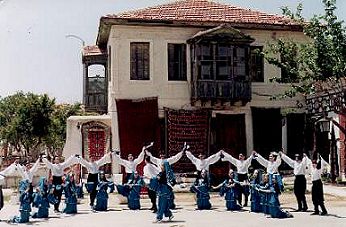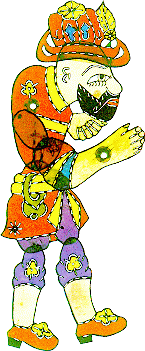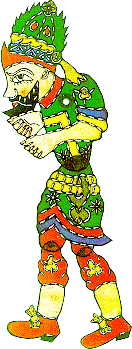Folk Music : The lively Turkish folkmusic, which orginated on the steppes of Asia, is in complete contrast to the refined Turkish classical music of the Ottoman court. Until recently, folkmusic was not written down, and the traditions have been kept alive by the "asiklar" (troubadours). Distinct from folkmusic is Ottoman military music, now performed by the "mehter takimi" (Janissary Band) in Istanbul, which originated in Central Asia, and is played with played with kettle, clarinets cymbals, and bells. The mystical music of the Whirling Dervishes (Mevleviler) is dominated by the haunting sound of the reed pipe or "ney", and can be heard in Konya during the Mevlana Festival in December.
Folk Dance : Each region in Turkey has its own special folkdance and costume, and the best-known of these are listed below :
"Horon" This Black Sea dance is performed by men only, dressed in black with silver trimmings.The dancers link arms and quiver to the vibrations of the "kemence" (a primitive kind of violin).
"Kasik Oyunu" The Spoon Dance is performed from Konya to Silifke and consists of gaily dressed male and female dancers 'clicking out the dance rhythm with a pair of wooden spoons in each hand.
"Kilic Kalkan" The Sword and Shield Dance of Bursa represents the Ottoman conquest of the city. It is performed by men only, dressed in early Ottoman battle dress, who dance to the sound of clashing swords and shields, without music.
"Zeybek" In this Aegean dance, colorfully dressed male dancers, called "efe", symbolize courage and heroism.
|

|

Karagöz
|
Folk Heroes :
"Nasrettin Hoca" a 13th century humorist and sage from Aksehir. His witticisms are known throughout Turkey and are often used to make a point.
"Karagoz" Another jester, said to have lived in Bursa in the 14th century and now immortalized as a shadow puppet. Karagoz is a rough man of the people, who uses his ribald wit to get the better of his pompous friend, Hacivat. The puppets are made from gaily painted, translucent animal skin and are projected onto a white screen.
"Yunus Emre" The 13th century philosopher-poet is one of Turkey's national treasures. His basic themes were universal love, friendship, brotherhood and divine justice. His simple and pure writing brings out a deep meaning for his readers and although he lived over 700 years ago, his work is still timely and thought provoking.
"Koroglu" A 15th century folk poet, Koroglu was a role model for his contemporaries and a hero of his time. His adventures have been recounted for centuries with prestige and vigor and perhaps now with more interest than ever. Koroglu was one of the first people to pioneer the ideal of unconditional help for the poor and down-trodde. He was also a great champion against the confines of government control and harassment.
|

Hacivat
|
Traditional Sports :
"Yagli Gures" "Grease Wrestling" is the Turkish national sport and every year, in July, wrestling championships are held in Kirkpinar, outside Edirne. The contest is made more difficult by the fact that the wrestlers smear themselves with oil.
"Cirit Oyunu" The "javelin game" of daredevil horsemanship is a sport where wooden javelins are thrown at horsemen of opposing teams to gain points. The game is played mainly in Eastern Turkey. Also, in Selcuk, in the Aegean region you can watch camel fights (in January), but if for some reason, weat her does not permit, don't despair, camel fights are held in many small towns throughout the springtime. At Artvin Kafkasor, a different type of bullfight is held (in June).
|

|
|
|









